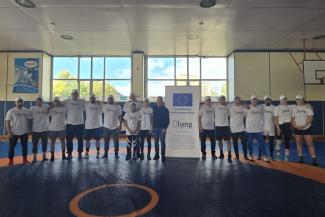Wrestling's Competition Schedule Finalized for Tokyo Olympics
Monday, July 20, 2020 - 21:48 By United World Wrestling Press

TOKYO (July 21) -- The wrestling competition schedule for the Tokyo Olympic Games has been finalized.
Wrestling will be contested on the final seven days of the Tokyo Olympics, Aug. 1-8, and held at Makhuari Messe Hall A. Women's wrestling will be spread across the seven days of the wrestling competition. Greco-Roman will take place Aug. 1-4, while freestyle is scheduled for Aug. 4-7.
Host nation Japan will look to continue its dominance in women's wrestling. The Japanese women have claimed 11 of 18 Olympic gold medals since 2004, the first year the sport was introduced at the Olympics.
Days 1/2: GR: 60kg, 130kg | WW: 76kg
Days 2/3: GR: 77kg, 97kg | WW: 68kg
Days 3/4: GR: 67kg, 87kg | WW: 62kg
Days 4/5: FS: 57kg, 86kg | WW: 57kg
Days 5/6: FS: 74kg, 125kg | WW: 53kg
Days 6/7: FS: 65kg, 97kg | WW: 50kg
The full schedule is as follows:
Day 1 (Sunday, August 1)
11:00-12:20 – 1/8 action (GR: 60kg, 130kg | WW: 76kg)
12:20-13:00 – Quarterfinals (GR: 60kg, 130kg | WW: 76kg)
18:15-19:15 – Semifinals (GR: 60kg, 130kg | WW: 76kg)
Day 2 (Monday, August 2)
11:00-11:30 – Repechage (GR: 60kg, 130kg | WW: 76kg)
11:30-12:50 – 1/8 action (GR: 77kg, 97kg | WW: 68kg)
12:50-13:30 – Quarterfinals (GR: 77kg, 97kg | WW: 68kg)
18:15-19:15 – Semifinals (GR: 77kg, 97kg | WW: 68kg)
19:30-22:00 – Gold and Bronze Medal Finals (GR: 60kg, 130kg | WW: 76kg)
Day 3 (Tuesday, August 3)
11:00-11:30 – Repechage (GR: 77kg, 97kg | WW: 68kg)
11:30-12:50 – 1/8 action (GR: 67kg, 87kg | WW: 62kg)
12:50-13:30 – Quarterfinals (GR: 67kg, 87kg | WW: 62kg)
18:15-19:15 – Semifinals (GR: 67kg, 87kg | WW: 62kg)
19:30-22:00 – Gold and Bronze Medal Finals (GR: 77kg, 97kg | WW: 68kg)
Day 4 (Wednesday, August 4)
11:00-11:30 – Repechage (GR: 67kg, 87kg | WW: 62kg)
11:30-12:50 – 1/8 action (FS: 57kg, 86kg | WW: 57kg)
12:50-13:30 – Quarterfinals (FS: 57kg, 86kg | WW: 57kg)
18:15-19:15 – Semifinals (FS: 57kg, 86kg | WW: 57kg)
19:30-22:00 – Gold and Bronze Medal Finals (GR: 67kg, 87kg | WW: 62kg)
Day 5 (Thursday, August 5)
11:00-11:30 – Repechage (FS: 57kg, 86kg | WW: 57kg)
11:30-12:50 – 1/8 action (FS: 74kg, 125kg | WW: 53kg)
12:50-13:30 – Quarterfinals (FS: 74kg, 125kg | WW: 53kg)
18:15-19:15 – Semifinals (FS: 74kg, 125kg | WW: 53kg)
19:30-22:00 – Gold and Bronze Medal Finals (FS: 57kg, 86kg | WW: 57kg)
Day 6 (Friday, August 6)
11:00-11:30 – Repechage (FS: 74kg, 125kg | WW: 53kg)
11:30-12:50 – 1/8 action (FS: 65kg, 97kg | WW: 50kg)
12:50-13:30 – Quarterfinals (FS: 65kg, 97kg | WW: 50kg)
18:15-19:15 – Semifinals (FS: 65kg, 97kg | WW: 50kg)
19:30-22:00 – Gold and Bronze Medal Finals (FS: 74kg, 125kg | WW: 53kg)
Day 7 (Saturday, August 7)
18:45-19:05 – Repechage (FS: 65kg, 97kg | WW: 50kg)
19:30-22:00 – Gold and Bronze Medal Finals (FS: 65kg, 97kg | WW: 50kg)


Share your thoughts.
Comments